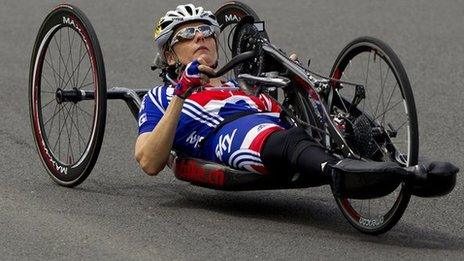Markus Rehm: The blade jumper fighting to be in able-bodied games
- Published
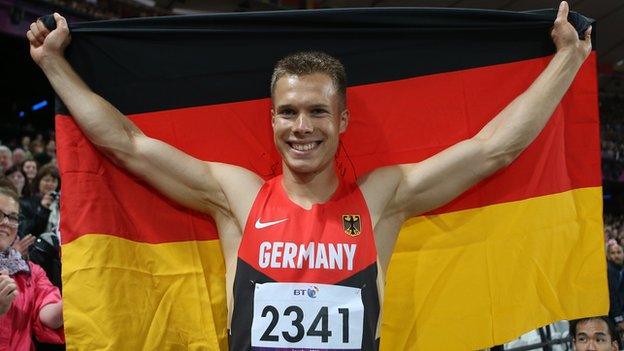
Markus Rehm won gold in the F44 long jump at the London 2012 Paralympics
On a windy lunchtime at the Swansea University track, Markus Rehm is relaxed and smiling - the most affable man you could possibly meet. But beneath that lies a talent and determination that could yet change sporting history.
The 26-year-old German Paralympic champion lost his lower right leg in a wakeboarding accident as a 14-year-old, and competes using a carbon fibre blade.
As a sprinter, he races in the same T44 class as Britain's Jonnie Peacock, winning bronze in the 100m behind the GB star on Tuesday at the IPC Athletics European Championships in Swansea.
But it is as a long jumper that he could break entirely new ground.
Rehm is the reigning Paralympic and world champion in the F44 class but there was still no particular expectation when he competed at the German able-bodied trials last month.
To everyone's astonishment, Rehm won - with a huge personal best of 8.24m,, external beating his Paralympic world record by 29cm.
It is a distance that would have won him a silver medal at the London Olympics behind Greg Rutherford - and 4cm further than the Briton's winning jump at the Commonwealth Games in Glasgow.
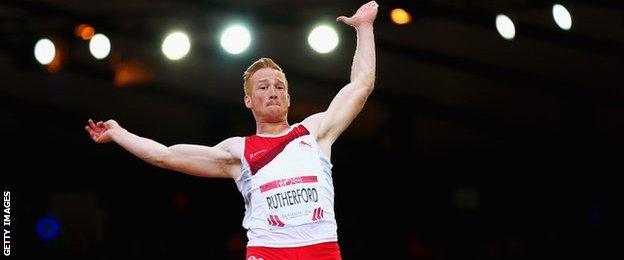
Rehm bettered Greg Rutherford's Commonwealth Games gold medal-winning mark by 4cm
His achievements also left the German Athletics Federation with a quandary. The winner of the trials would have normally been an automatic pick for the European Championships in Zurich.
But they decided against selecting the blade-jumper for the able-bodied championship, saying they had doubts over whether jumps with a prosthetic limb could be compared to those using a natural joint.
Experts have questioned whether the blade gives Rehm an advantage when he plants it at the point of take-off.
While he is diplomatic about the decision to omit him from the German team, he told BBC Sport that he does not believe he benefits from his blade.
"I don't like this idea of a catapult effect at take-off," he said. "If it was so easy to jump with a prosthetic, everyone would just get one and a few days later, they'd be jumping seven metres. I don't think that's fair - and it's not true."
Rehm argues that if there is a small benefit on take-off, it is balanced by a disadvantage during the run-up. He now wants more testing to prove that he does not get an unfair advantage from the blade.
The debate echoes the one involving South African double amputee Oscar Pistorius six years ago. He was eventually allowed to run in able-bodied competitions - including the London Olympics - but only after a lengthy process of scientific tests and appeals.
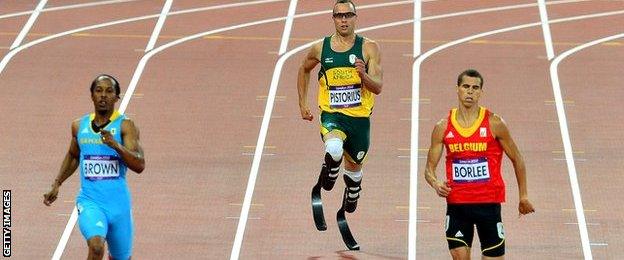
Oscar Pistorius made history by becoming the first amputee sprinter to compete at the Olympics
Rehm's case is arguably even more significant. For all his ability, Pistorius was never a serious challenger to the very best able-bodied runners but Rehm's performances could put him in contention for international titles.
He says it is too early to think about the possibility of competing at the Rio Olympics. But he does want to jump in more high-profile events against able-bodied rivals.
"Many people are afraid that in a few years' time, there will be just people with prostheses in able-bodied finals," he added. "But that's the wrong thinking."
Britain's top amputee long-jumper, Stef Reid, won silver at the London Paralympics and she also believes that - in this event at least - the traditional barriers could soon come down.
"We're going to find out this is not a one-off," she told BBC Sport. "Once we start bringing through the talent, we're going to end up with a pool of athletes who can start competing in the able-bodied stream.
"Markus is a huge inspiration but I want people to realise these blades are not passive things that catapult us. They only return the energy that you put in to them and it is incredibly hard work."
Disabled athletes who have competed in the Paralympics and Olympics | |
|---|---|
Neroli Fairhall - Los Angeles 1984 | Paralysed from the waist down - became first paraplegic competitor in the Olympic Games. |
Sonia Vettenburg - Barcelona 1992 | Wheelchair user - won medals at the 1984 and 1988 Paralympic Games and finished 37th at the Barcelona Olympic Games in the women's 10 metre air pistol. |
Paola Fantato - Atlanta 1996 | Born with polio - first athlete to compete in the Olympics and Paralympics in the same year when she took part in both Games at Atlanta 1996. |
Terence Parkin - Sydney 2000, Athens 2004 | Deaf swimmer - won silver in the 200m breaststroke at the Sydney 2000 Olympics, and also competed at the 2004 Games in Athens. |
Marla Runyan - Sydney 2000, Athens 2004 | Visually impaired runner - finished eighth in the 1500m at Sydney 2000. |
Natalie du Toit - Bejing 2008 | Amputee - finished 16th in the open water 10km swim. Became first Para-athlete to carry a flag in both Olympics and Paralympics in a single year. |
Natalia Partyka - Bejing 2008, London 2012 | Congenital amputee - competed in both Olympics and became Paralympic table tennis champion at London 2012. |
Oscar Pistorius - London 2012 | Double amputee - became first double amputee to take part in both the Olympics and Paralympics. |
The president of the International Paralympic Committee, Sir Philip Craven, says that while Rehm's ambitions are "a good thing", the scope for Paralympic athletes to compete against able-bodied rivals is very limited.
"What we're looking at here is a handful of athletes - with a prosthetic limb - which gives them the opportunity to compete towards a level playing field," he said.
"It is a very small minority. You'll get it with Markus and you got it with Oscar - but it won't be many. The people we're most interested in is all of our athlete population."
As with Pistorius's case, the International Association of Athletics Federations (IAAF) will make any decision on whether Rehm can compete at the highest level of able-bodied competition at European and World Championships and Olympic Games - but that could be a lengthy process
The German is determined to be patient. "I want to fight for this," he said. "We have to find solutions for the future.
"We are all proud to be Paralympians - and we just want to show what we are able to do."
- Attribution
- Published31 July 2014
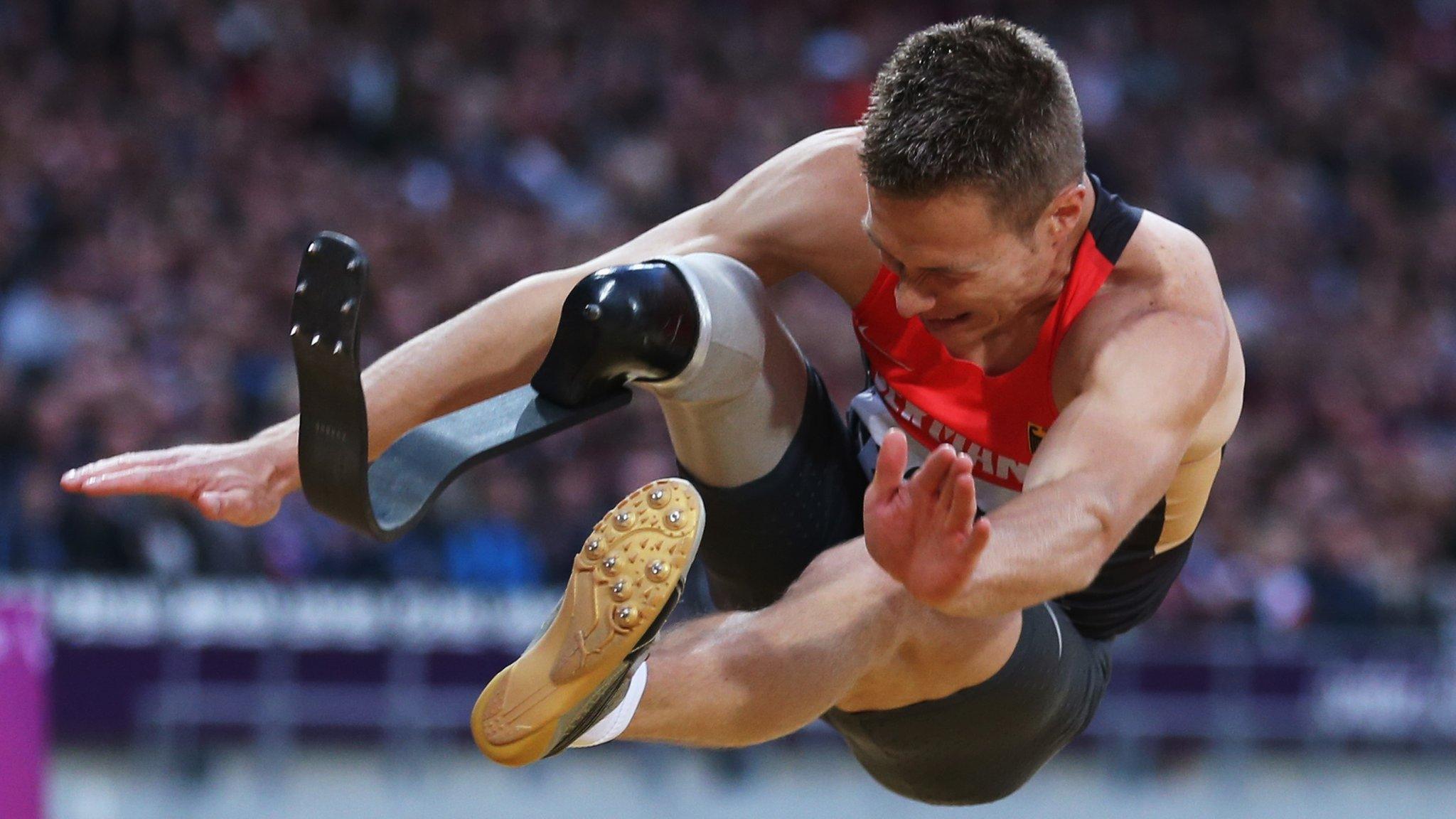
- Published3 August 2014
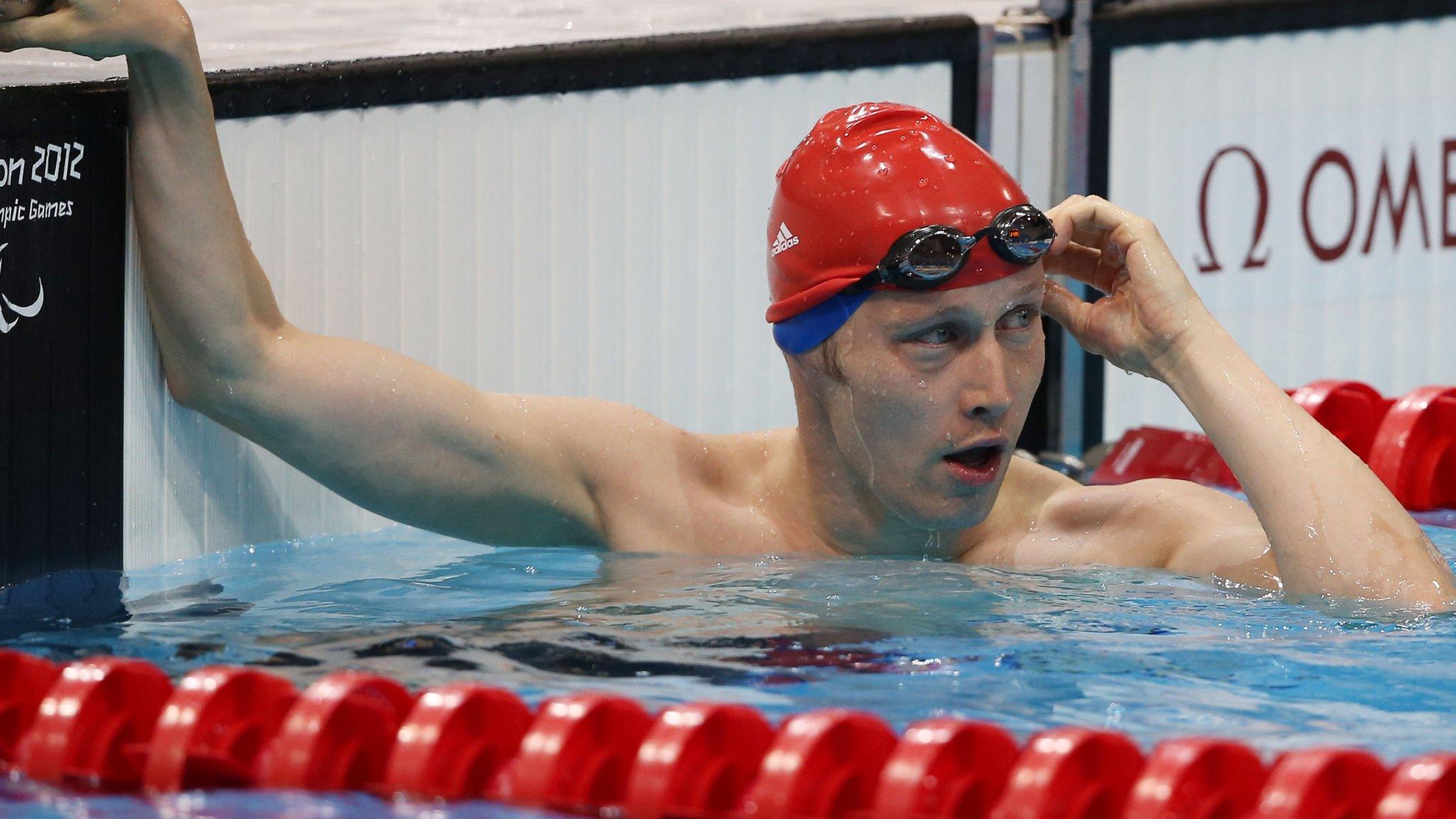
- Published5 September 2016
